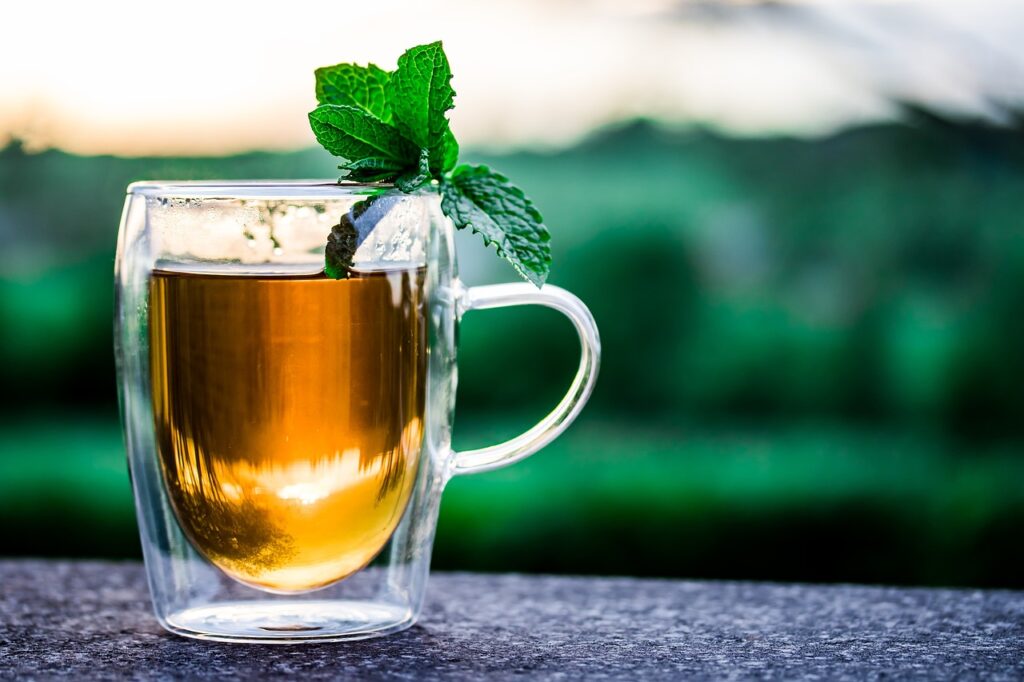Table of Contents
Understanding the Health Benefits of Herbal Teas
Herbal teas, also known as tisanes, are plant-based infusions that offer a wide range of health benefits. Unlike traditional tea made from Camellia sinensis leaves, herbal teas do not contain caffeine and are often consumed for their soothing properties.
Immune Boosting: Some of the most notable health benefits associated with drinking herbal teas include improved immune function, particularly when it comes to supporting the body’s natural defense mechanisms against colds and flu. Herbal blends such as echinacea, elderberry or ginger may help fight off infections by stimulating white blood cells production which enhances immunity significantly.
Better Mental Health: In addition to physical health benefits, certain herbs can also be beneficial in promoting good mental health and relaxation. Chamomile is known for its calming effects on both the mind and body while lavender can promote feelings of tranquility and reduce anxiety levels for many people.
Promoting Digestive Health: There are many digestive issues that can benefit from an herbal tea regimen: peppermint aids digestion by relaxing stomach muscles thereby relieving pain; fennel promotes healthy digestion because it stimulates bile flow; ginger quickens movement through your digestive system providing relief for indigestion problems like bloating or heartburn.
Note: As much as there are so many amazing herbals out there touting various purported functionality especially with regards to medical remedies – cautionary measures should be taken before jumping on any bandwagon claimed all-natural remedy without careful use advised by professional physicians, pharmacists or nutritionist.
Popular Varieties and Their Unique Properties
Herbal teas come in a wide range of flavors and each variety offers unique health benefits. Here are some popular types:
Chamomile Tea:
This tea is known for its calming properties, helping to reduce anxiety and promote relaxation. Chamomile tea can also aid with digestion and soothe an upset stomach.
Pomegranate Tea:
A rich source of antioxidants, pomegranate tea can help to improve heart health, lower blood pressure, fight inflammation, and protect against certain types of cancer.
Ginger Tea:
Ginger tea has natural anti-inflammatory properties that make it effective in soothing sore muscles or relieving nausea caused by motion sickness or morning sickness during pregnancy. It’s also said to be helpful in reducing menstrual cramps!
Lavender Tea:
The aroma alone from lavender flowers is enough to help you relax – making this one a perfect bedtime brew! Lavender is also thought to have therapeutic effects on the nervous system so it’s ideal for anxiety sufferers too.
Hibiscus Flower Tea:
Hibiscus flower tea contains powerful antioxidants known as anthocyanins which give it its vibrant red coloration. This herbal blend has been shown to support healthy cholesterol levels while enhancing liver function – all while providing thirst-quenching hydration!
Best Brewing Practices for Optimal Flavor and Nutrient Extraction
If you’re looking to drink your way to good health with herbal teas, it’s important to ensure that you’re brewing them in a way that extracts the most flavor and nutrients. Here are some tips:
- Water Temperature: Different types of herbal teas require different water temperatures. As a general rule, delicate herbal blends like chamomile or hibiscus should be brewed with water that’s just below boiling point (around 200°F), while heartier herbs like ginger or peppermint can handle hotter water (around 212°F).
- Brewing Time: Herbal teas need time to steep in order to extract their full potential. However, if left too long they may become bitter or overpowering. Typically, between three and five minutes is enough, but always refer to the instructions on the tea packaging.
- Cover While Steeping: Covering your teapot or mug while your tea steeps helps retain heat and allows for better extraction of essential oils and flavors from the herbs.
- Freshness Matters: The fresher your herbs are, the more potent their taste and benefits will be when infused into tea. Try buying loose-leaf blends from reputable sources whenever possible instead of pre-packaged bags – which might have lost potency over time-
To add even more depth of flavor – try experimenting with additives such as honey , lemon slices & fresh mint leaves . These natural sweeteners also provide added health benefits such as providing relief from colds , coughs , sore throats & easing digestion . In addition – these natural boosters provide an extra antioxidant punch to your already healthy herbal tea.
Brewing herbal teas is a simple yet satisfying way to incorporate more wellness into your daily routine. By understanding these best brewing practices, you can ensure every sip delivers optimal flavor and benefit–making it an especially enjoyable experience!
Incorporating Herbal Teas into Your Daily Routine
To get started on your journey to healthier habits, consider swapping out your morning cup of coffee for a mug of green tea or yerba mate. These energizing varieties provide the perfect pick-me-up without the jittery side effects associated with caffeine.
For midday slumps or afternoon fatigue, reach for a blend that incorporates herbs like ginseng or ashwagandha to help support mental clarity and focus. Or try chamomile or lavender tea to promote relaxation and reduce stress after a long day at work.
Another great way to incorporate herbal teas into your routine is by establishing rituals around mealtimes. Sipping on peppermint tea after dinner can aid digestion and freshen breath naturally while adding flavor and hydration to meals throughout the day.
Pro Tip: Experiment with different blends until you find ones that appeal most to your taste buds!
Whether as part of an overall wellness strategy or simply as an enjoyable habit, incorporating herbal teas into your daily routine is one small step you can take today towards good health tomorrow!
Supporting Digestive Health with Tea Infusions
Herbal teas are a great way to support digestive health and soothe common gastrointestinal issues. Here are some popular herbs that can aid in digestion and improve overall gut health:
- Peppermint: Known for its relaxing effects on the digestive muscles, peppermint tea can help reduce bloating, cramping, and indigestion.
- Ginger: A powerful anti-inflammatory agent that helps relieve nausea, vomiting, and other stomach discomforts. Ginger tea is also known to boost immunity.
- Fennel: Rich in antioxidants like flavonoids and phenolic compounds that combat inflammation. Fennel seeds have been traditionally used as a carminative to stimulate digestion process.
Including herbal teas in your daily routine may not only help alleviate uncomfortable symptoms but also prevent chronic diseases associated with poor gut function such as irritable bowel syndrome (IBS) or inflammatory bowel disease (IBD). The following tips can enhance the benefits of herbal infusions on your digestive tract:
- Brew your tea properly: Letting your herbs steep for at least 5-7 minutes will ensure that you get the full dose of beneficial compounds from them.
- Sip slowly before or after meals: Drinking tea before a meal stimulates saliva production which aids digestion while consuming it after eating helps soothe bloating due to overeating or consuming heavy foods. Note: Avoid drinking too much directly after mealtime because this might lead to diluting the gastric juices present during ingestion. <
Finding Quality Sources for Organic, Non-Toxic Blends
When it comes to choosing herbal teas for health benefits, the quality and safety of the tea blend is crucial. Many brands add synthetic flavors, colors, and chemicals that can be harmful to your health. To ensure that you are drinking safe and healthy tea blends, here are some tips on how to find quality sources:
- Research Brands: Look into different brands and their commitment to sourcing organic ingredients and avoiding toxic chemicals in their products.
- Certifications: Check if a brand has any certifications from organizations like USDA Organic or Fair Trade. These certifications indicate that the product meets specific standards related to sustainability and environmental responsibility.
- Ingredient List: Always check the ingredient list before making a purchase. Avoid teas with artificial additives like flavorings or colorings.
- Taste Test: If possible, try out different herbal tea blends before committing to purchasing them in bulk. This will give you an idea of whether or not you enjoy the taste of a particular blend.
Finding high-quality herbal teas may take more effort than just grabbing whatever is available at your local grocery store; however, it’s worth investing time into finding blends that provide maximum health benefits while also being free from harmful substances.
In conclusion, always remember to prioritize quality over convenience when selecting herbal tea blends for good health!




